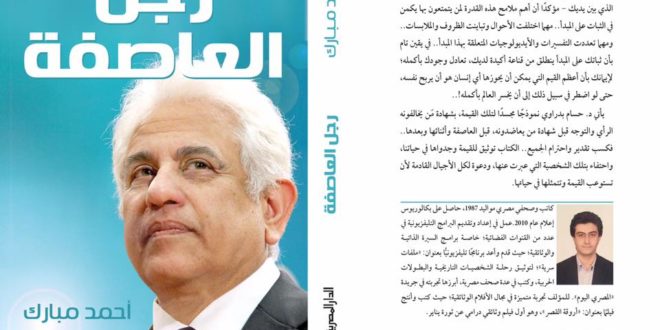A new book titled “Man of the Storm” uncovered controversial details about Dr. Hossam Badrawi, the political figure to whom millions of Egyptians looked forward to during the January 2011 Revolution, being the man who had the confidence of the government and opposition, authority and street, presidency and political powers, at the same level. Also, he was a reliable mediator to fulfill the political solution for the crisis, to persuade former President Hosni Mubarak to leave quietly, to secure a safe exit for Mubarak and his family. Dr. Badrawi managed would have done this unless unidentified forces had intervened and interrupted the way. The book which is composed by young Journalist Ahmed Mubarak revealed that Badrawi was not at the forefront of the [political] scene for no reason. After studying medicine in the United States, he approached the political reality through his relation with his father-in-law, Major General Hassan Abu Basha, Egypt former Minister of Interior, dubbed “the Political Ministry of Interior” for depending on politics more than security grip in handling the file of political Islam. Although Abu Basha’s proximity to the government and joining the National Party, he launched the liberal “New Call” association with Dr. Saad Eddin Ibrahim, Dr. Said Al-Naggar and other opposition members from Al-Wafd Party.
The book showed that Badrawi decided to practice politics by forming an opposition from within “NDP”. He founded “Descendants of Pharaohs” and “Dreamers of Tomorrow” families, in 1993 and 1995 respectively. These are families that are based on educating youth on political grounds, not promoting for the “children of power” idea in them and preparing them for leadership and competition on the grounds of competency, creativity and innovation. It was an approach that “was not welcomed by authorities in Mubarak’s era, according to the book. Administrative hands started closing in on it,” leading him in 2000 to move his battle out of the university walls; he run for parliamentary elections through the NDP, under “The Change” slogan.
| · Interestingly, in Hossam Badrawi’s biography, he engaged in politics after he had refused to be engaged in two fields: the first is academic and medical and the second is football, in which he achieved a remarkable distinction. He played for Al-Ahly SC and joined its juniors’ team in 1969. He had a bright future after Mahmoud El-Gohary scouted him. |
After being a parliament member, he chaired the committee of Education. He chose to be a “reformist” with whom neither the government nor the opposition feel comfortable. In the book, he himself described the reasons behind this situation stating, “I joined the NDP pointing out that reforming from inside is more influencing than from outside. In the end, they are all mechanisms.” The situation did not last long, “it was defeated in 2005 elections”. Late Journalist Magdi Mehanna asked, “Was Badrawi defeated because he led the change campaign within the party, led reformation against the old guard?” According to the book, at this moment, “Egyptian Movement for Change (Kefaya) sought to attract him and George Isaac went to him to persuade him to join it. Badrawi apologized, considering that any reform would only pass through the NDP.
Hence, he continued his journey and supported opposition demands for constitutional amendments, amending Article 77 regarding accepting competition for presidential elections, accepting monitoring the elections and rejecting emergency law. He joined the Human Rights Council, called upon assigning a minister for such rights and reached the peak of distinction by accepting the invitation for Suhur (last meal before daybreak during Ramadan) extended by Kefaya, which was in obvious adversary with Mubarak.
During Jan. 2011 crisis, the choice moment came in Badrawi’s history. He became the straw that everyone clutches at, and foremost Mubarak who communicated with Badrawi, assigned him as Secretary General of the NDP and invited him to a special meeting, in which Mubarak said the strangest statement, “Do not get angry for not appointing you as a minister. I did so lest you got hurt.”
The book narrates the details of Hossam Badrawi’s back and forth meetings with young revolutionists and the then-president Mubarak, which were concluded by persuading the latter to step down. Were it not for forces which identities and details were not disclosed by him later interfered to ruin the deal.
Afterwards, a political era ended and many influential figures lost their positions. However, Dr. Hossam Badrawi gained history and reputation, even a potential future too. It ends with testimonials of Egyptian opposition and independent members against former NDP Secretary General, as a proof of what the book included. Thus, it denied the claims that loyal media campaigns repeated considering him a “disguised opponent,” and other campaigns seeing it “a kind of roles division,” including Kefaya leader George Isaac, Leftist Opposer Dr. Refaat El-Saeed, Dr. Mohamed Makhzangi, Novelist and former assistant to the president Dr. Mostafa El-Feki’s.
Visit the original article
http://www.emaratalyoum.com/politics/weekly-supplements/beyond-politics/2017-02-24-1.972931
 Dr. Hossam Badrawi Official Website
Dr. Hossam Badrawi Official Website


